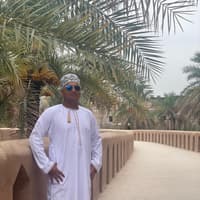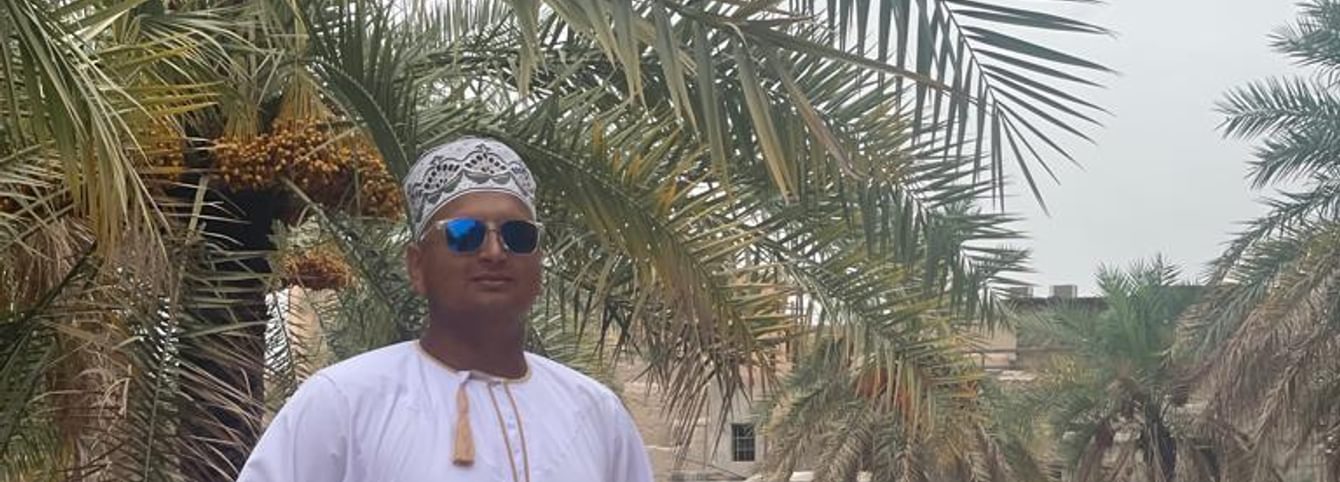Wajahat Mohiuddin
Wajahat Mohiuddin participated in the 2023 CLS Arabic Program hosted by Noor Majan Arabic Institute in Nizwa, Oman. Wajahat received his Bachelor of Science in Human Resource Development and Bachelor of Arts in World Cultures & Literature with a concentration in Middle Eastern Studies from the University of Houston.
Getting to Know Wajahat
I was born and raised in Saudi Arabia and growing up there was what first got me interested in learning Arabic. I am a huge sports fan and especially love football (soccer) as well as cricket. My favorite team is the Saudi national team, so I was over the moon when they beat eventual champions Argentina in the 2022 FIFA World Cup. I love traveling and I have visited 17 different countries on 4 continents.
Along with studying Arabic at the University of Houston, I had the great honor of receiving a grant from UH to study Arabic at Sijal Institute in Amman, Jordan in the summer of 2022. It was my first time visiting an Arab country outside the Gulf region, so it was interesting to see the differences between the Levant and the Gulf.
Since then, I have been to almost every Arabic speaking country in the Middle East. I have other countries in North Africa I plan to add to my list!
A Favorite Word in Arabic
My favorite Arabic word is a common word used by Arabic speakers as well as Muslims worldwide which is Insha’Allah.
It means “God willing” or “If God wills.” It is normally used when you hope for something to happen in the future, for example “Insha’Allah we will win the match.” However, it is also used in an ironic sense. Many people have taken to using the term as a polite alternative for no, especially Arab and Muslim parents, like you could ask your parents to buy you something and they would say Insha’Allah.
Future Career Goals
My professional goal is to eventually work for a global organization in an Arabic speaking country. I plan to use Arabic at work so that my team members would be comfortable articulating their thoughts to me in their native language. I can be a struggle to get your point across in a second or third language, so I hope to use my knowledge of Arabic to bridge this gap.
Cultural Exchange
My favorite part of my CLS experience was interacting with locals. I always enjoyed sessions with our language partners. My language partner also hung out with us outside of the scheduled times so this enhanced my language learning experience. I got to use the Omani Arabic that we learned outside of the classroom to speak to his family and friends and exchange stories and ideas.
I especially loved it when I told my language partner’s father that I was born and raised in Saudi Arabia to which he replied, “Oh, so you are one of us!” In that moment, I felt really welcomed.
I also received first-hand accounts of the Dhofar War from veterans that participated in it and learned about the dialects of Arabic spoken in the Dhofar region. Our tour guide in gave us an Omani history lesson and we met some kids who taught us phrases in their dialect of Arabic.
I took all my interactions with Omanis as learning lessons since speaking with each person taught me something new. I am still in contact with quite a few of them, which shows me that our interactions were not just a one-way street but that as much as I learned from them, they also learned from me.
Why Should Others Learn Arabic?
Arabic is an amazing language to learn and not only because it is the fifth most spoken language in the world and the official language of 25 countries, but also because Arabic has an intrinsic relationship to Arab culture, and you cannot fully understand one without the other. Learning Arabic opens doors to Middle Eastern and North African art, literature, religion, history, and many other fields.
Words of Advice
Do not be afraid of applying! Each of you is unique in your own way and possesses unique skillsets, so regardless of your background or your education, you all have something to offer to the CLS Program. Be yourself when applying and express your genuine desire for learning your target language and using it in your future, and Insha’Allah the CLS Program will follow.
A final word of advice is to embrace the language and culture in the host country. CLS will provide you with plenty of opportunities to use the language in your daily life outside of the classroom, so take advantage of it and keep practicing. Mistakes will be made, and it will be tough to adjust to the host country at first but know that we have all been there so take it in stride and use the mistakes as learning opportunities.
I highly recommend using the Alumni Resource Directory for help with any questions related to CLS. As alumni, we have been where you are now and are all happy to help answer any questions or concerns that you may have, whether it be about life in a host country, the CLS application, or anything else.
Alumni Profiles

Arabic 2023
Nizwa, Oman
Posted Date
August 09, 2024


